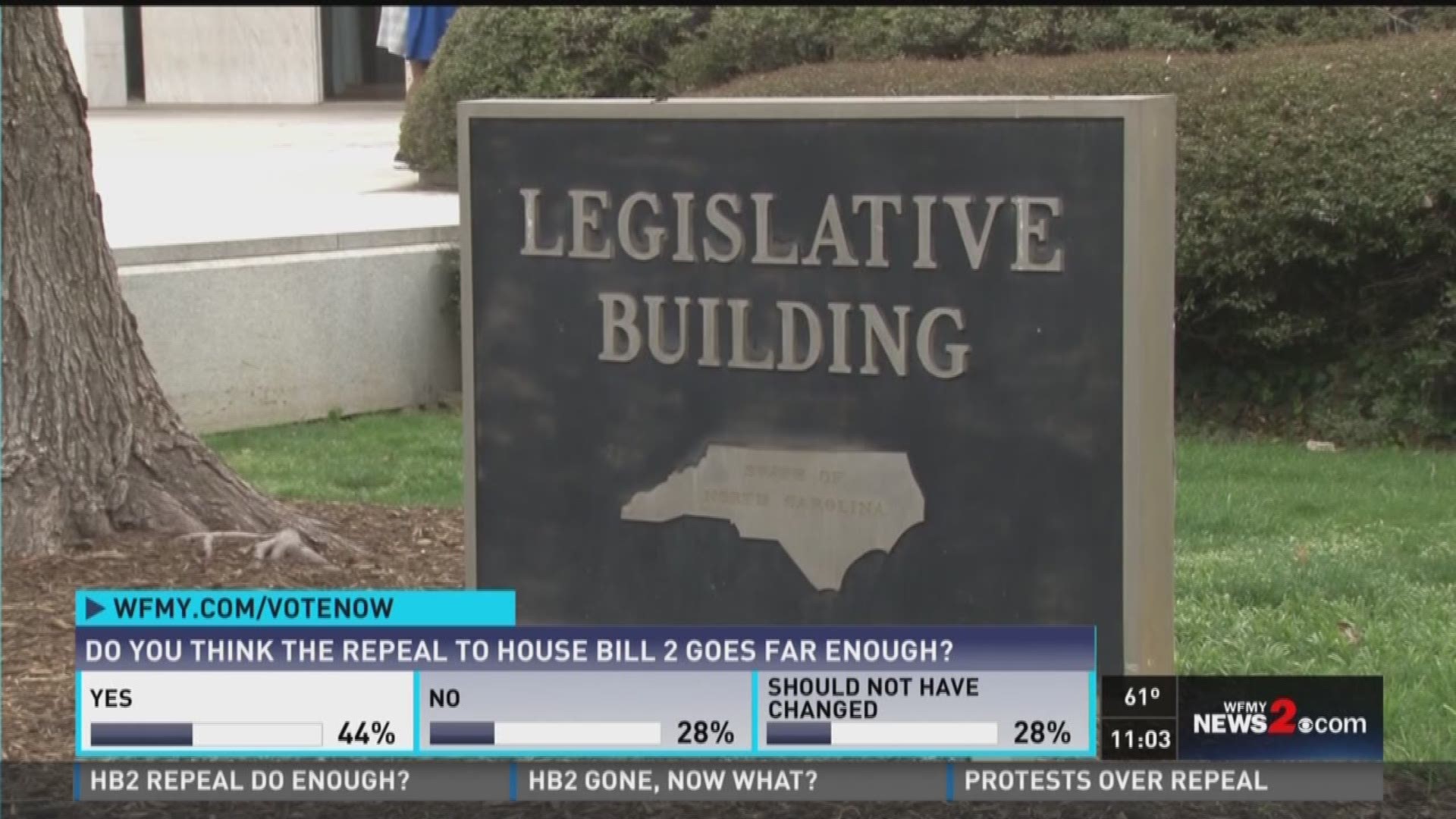North Carolina Governor Roy Cooper signed legislation Thursday to repeal the state’s “bathroom bill." Hoping to end backlash over transgender rights that cost the state in business projects, conventions and basketball tournaments, Cooper said the deal wasn’t perfect but it was a compromise.
The bill repeals HB2, but HB142 replaced it with prohibitions on local governments. Cities, towns and schools are prohibited from enacting new non-discrimination ordinances until 2020.
The repeal effort also only allows rules related to the bathroom to be in control of the state legislature.
The compromise didn’t sit well with both Republicans and Democrats. Conservatives continued to defend HB2 as a necessary law to protect women and children in bathrooms, while activists said the new measure still denies them protection from discrimination.
“There's no way that we can say that this bill is in anyway supportive of LGBTQ rights,” said Representative Cecil Brockman, D-Guilford. “And that’s why every single civil rights group, and LGBT folks have come out against the bill.”
Some Republican representatives expressed concerns that the legislature was bowing to demands of the NCAA.
“Perhaps it would be appropriate if we would commemorate the passing of this bill by inviting the Governor to come down to the building today and lowering those 2 flags and putting up in their place a flag of a certain inter-collegian athletic association,” said Representative Bert Jones, R-Caswell.
Caswell was referencing the NCAA and the deadline the league gave the state over HB2. The NCAA said North Carolina lawmakers had until Thursday to repeal the law or lose championship events until 2020.
In the Beginning
In early 2016, Charlotte passed an ordinance adding gender identity to the city’s protection against discrimination in public accommodations.
“Much of this legislation doesn’t even mention stuff about bathrooms,” said Jason Husser, a Political Science Professor at Elon University.
Charlotte’s law was about gender identity as a protected class, much like race, religion and national origin.
“Some of this goes back to the days when bathrooms were segregated based on race and so if you add gender identity into the same class as race it also implies that public facilities like bathrooms do get those same protections.”
HB2 was passed shortly after, stating people must use the bathroom associated with their biological sex in government-owned bathrooms.
“We don’t think about how many bathrooms the government actually owns across the state but they own a lot from everywhere to rest areas to universities to state parks to various state buildings,” said Husser.
The repeal bill basically puts the state back to a pre-HB2 era. So, what was the law regarding bathrooms prior to HB2?
“There really wasn’t one,” said Husser.
A person could be arrested for trespassing in a bathroom not coordinating with their private parts, however a person would have to complain first.
“The state is not taking a position in terms of you can or you can’t.”
Then What Did Lawmakers Do?
HB2 is repealed. However, prior to HB2 local governments could pass their own anti-discrimination ordinances, much like Charlotte did. Now, local governments cannot pass their own anti-discrimination ordinances or add a class to a list of those protected, that means LGBTQ people, the elderly or even veterans. Local governments also cannot make changes to minimum wage.
Greensboro had a non-discrimination policy in place prior to HB2. It was one of the only cities to add veterans, sexual orientation and gender identity protections for housing, city employees and city programs. That ordinance is still valid.
Husser explained the state taking a back seat to the gender identity controversy. Some civil rights groups argue; a lack of protection is the same as allowing discrimination.
“It goes back to this really big debate on is it enough to stop discrimination or to fight discrimination just to say we’re not discriminating or do you have to take proactive steps to sort of affirmatively resist discrimination,” Husser explained.
2020 was set as the deadline for the prohibitions on local governments to end. Senate leader Phil Berger said this allowed time for federal ligation regarding transgender issues to play out.
"It’s really unusual for state governments to say here’s this complicated issue, let’s let federal government solve it,” said Husser.
Federal law prohibits any public accommodation from discriminating based on "race, color, religion, or national origin." It makes no mention of sexual orientation or gender identity. The conversation regarding adding sexual orientation and gender identity as a protected class would likely have to reach the Supreme Court for a final say.
“Some ways the way this ends of shaking out might depend upon how the Supreme Court confirmation of (President Donald) Trump’s nominee in the next week or two.”
To end the fight at state and local government levels, the Supreme Court would either affirmatively say sexual orientation or gender identity is a protected class or affirmatively say it’s not.
So, to answer the big question of what now and does the repeal fix anything, Husser said, North Carolina is pretty much the same as many other states.
Nineteen states protect both public and private employees based on sexual orientation and gender identity, per the American Civil Liberties Union. Another three protect employees based on sexual orientation.

